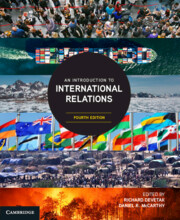Book contents
- Frontmatter
- Contents
- Tables, figures and boxes
- Contributors
- Preface and acknowledgements
- Guide to online instructor resources
- Introduction: The origins and changing agendas of international relations
- Part 1 Theories of International Relations
- Part 2 International history
- Part 3 The traditional agenda: States, wars and law
- Part 4 The new agenda: Globalisation and global challenges
- References
- Index
- Figure and text acknowledgements
- References
References
Published online by Cambridge University Press: aN Invalid Date NaN
- Frontmatter
- Contents
- Tables, figures and boxes
- Contributors
- Preface and acknowledgements
- Guide to online instructor resources
- Introduction: The origins and changing agendas of international relations
- Part 1 Theories of International Relations
- Part 2 International history
- Part 3 The traditional agenda: States, wars and law
- Part 4 The new agenda: Globalisation and global challenges
- References
- Index
- Figure and text acknowledgements
- References
- Type
- Chapter
- Information
- An Introduction to International Relations , pp. 490 - 548Publisher: Cambridge University PressPrint publication year: 2024



